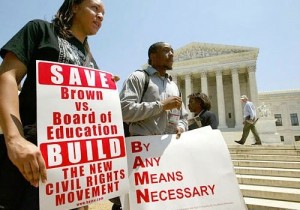 The following Letter to the Editor was written in response to an editorial in the LA Times of Nov 30, 2012. The editorial attacks the recent 6th Circuit decision which affirmed BAMN’s legal challenges and declared Michigan’s ban on affirmative action to be in violation of the 14th Amendment. The LA Times claims to stand for affirmative action but insists that the majority-white electorate of Michigan ought to have the right to ban all affirmative action programs thereby establishing a separate and unequal political process by which minority communities, and only minority communities, must seek redress to their grievances against an admissions process that is biased and racist. The LA Times has yet to print this reply to their ahistorical diatribe.
The following Letter to the Editor was written in response to an editorial in the LA Times of Nov 30, 2012. The editorial attacks the recent 6th Circuit decision which affirmed BAMN’s legal challenges and declared Michigan’s ban on affirmative action to be in violation of the 14th Amendment. The LA Times claims to stand for affirmative action but insists that the majority-white electorate of Michigan ought to have the right to ban all affirmative action programs thereby establishing a separate and unequal political process by which minority communities, and only minority communities, must seek redress to their grievances against an admissions process that is biased and racist. The LA Times has yet to print this reply to their ahistorical diatribe.
The Sixth Circuit’s decision striking down Michigan’s ban on the consideration of affirmative action in college admissions is of profound importance to Michigan, to California, and to the nation.
But in their rush to oppose that decision, the conservatives and most of the media have ignored the real logic of that decision.
The Sixth Circuit’s decision rests firmly on the limits on majority rule that the Fourteenth Amendment imposes. That Amendment, forged in the heat of Reconstruction, specifically aimed at preventing a white electorate or political majority from depriving black and, by implication, other minority citizens of equal political rights to fight for changes in the racial status quo. No vote by the electorate—and in particular no vote by a white majority electorate—may deprive racial minorities of that fundamental right.
Those who oppose the Sixth Circuit decision claim that they, too, are for equal political rights—except they say when minorities seek “preferences.”
But what do they mean by “preferences?”
As Ward Connerly and every other opponent of affirmative action have long said, “preferences” means admitting minority students who on average have lower grades and test scores than rejected white applicants—no matter how good the minority students’ scores are or how biased the tests and the other criteria may be.
Even a moment’s reflection shows how absurd the position of the critics of the Sixth Circuit decision actually is. Minorities have equal rights—except when they dare to ask for a departure from the apparently sacrosanct criteria of grades and test scores. Somehow, rights under the Fourteenth Amendment are limited by the results of a test first manufactured over a century later by a company in Princeton, New Jersey.
Indeed, the critics say, it does not matter that the ban on “preferences” applies only to minority students. Poor students, rural students, veterans and host of other groups have the right to seek departures from the grade-test score criteria which almost everyone agrees are entirely justified and which in fact have long been given. So, too, with no justification, do the children of alumni and the children of the rich or powerful. But racial minorities alone, the critics say, may seek departures from the grade and test score system if and only if the white majority gives its consent by referendum vote.
For those who have any acquaintance with the real history of the fight for racial equality in this country, all this is familiar. President Andrew Johnson opposed the Freedmen’s Act because it was a “preference.” Southern Senators opposed the Civil Rights Act of 1964 because it supposedly contained “preferences.” And Ward Connerly has opposed the programs that produced a President, an Attorney General, a Secretary of State and an entire generation of distinguished black and Latino/a leaders because the programs supposedly contained “preferences.”
Today, as in our past, the cry of “preferences” is the excuse of choice for those who do not believe in equal rights. Racial minorities have equal rights except for when they seek to upset or depart from an admissions system that discriminates against minority applicants —and that just happens to confer real advantages on white applicants.
The Sixth Circuit rightly rejected this modern version of second-class citizenship. We believe that Justice Kennedy, who rejected a similar argument in his great decision in Romer v. Evans, will do so as well if the Supreme Court decides to review the Sixth Circuit decision on its merits.
In the meantime, we would ask those who say they are for affirmative action—so long as a white majority deigns to afford racial minorities the political right to fight for affirmative action—to consider carefully the company they keep and the arguments they are making.
